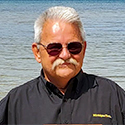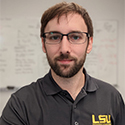Machine Learning for Automated Detection of Shipwreck Sites from Large Area Robotic Surveys
May 23 - June 3, 2022 / June 5 - 23, 2023
Exploration Team

Katherine A. Skinner
Principal Investigator
Assistant Professor, University of Michigan, Department of Robotics
Dr. Katherine A. Skinner is an Assistant Professor in the Department of Robotics at the University of Michigan, where she directs the Field Robotics Group (FROG) and co-directs the Ford Center for Autonomous Vehicles (FVAC). She holds a courtesy appointment in the Department of Naval Architecture and Marine Engineering. Her research focuses on sensing, perception, and machine learning for marine robotics and autonomous vehicles. Prior to this appointment, she was a postdoctoral fellow in the Daniel Guggenheim School of Aerospace Engineering and the School of Earth and Atmospheric Sciences at Georgia Institute of Technology. She received an M.S. and Ph.D. from the Robotics Institute at the University of Michigan, and a B.S.E. in mechanical and aerospace engineering with a Certificate in Applications of Computing from Princeton University.

Corina Barbalata
Co-Principal Investigator
Assistant Professor, Louisiana State University, Department of Mechanical and Industrial Engineering
Dr. Corina Barbalata is an Assistant Professor at Louisiana State University in the Department of Mechanical and Industrial Engineering, where she co-directs the Innovation in Control and Robotics Engineering Lab (iCore Lab). Previously, she was a postdoctoral research fellow at University of Michigan. She obtained her Ph.D. from Heriot-Watt University, United Kingdom, and has a double master’s degree in computer vision and robotics from the University of Burgundy and Heriot-Watt University. Her work is focused on proposing solutions for real-world robotics applications with social and environmental merits, focusing on dynamic modeling, control, and motion planning for autonomous systems.

Timothy C. Havens
Co-Principal Investigator, Year 2
William and Gloria Jackson Professor, Computer Science, Michigan Technological University
Tim Havens is the Director of the Great Lakes Research Center and Institute of Computing and Cybersystems at Michigan Tech. He received his Ph.D. in electrical and computer engineering from the University of Missouri. Prior to joining Michigan Tech, he was an NSF/CRA Computing Innovation Postdoctoral Fellow at Michigan State University. Before his doctoral work, he was an associate technical staff member at MIT Lincoln Laboratory. He investigates algorithms and sensor architectures for robust autonomy, machine learning, and artificial intelligence for multimodal sensing systems and large-language models.

Guy A. Meadows
Co-Principal Investigator, Year 1
Robbins Professor of Sustainable Marine Engineering, Great Lakes Research Center, Michigan Technological University
Upon graduation from Purdue University in 1977, Guy Meadows joined the faculty of the University of Michigan, College of Engineering, where he served as Professor of Physical Oceanography for 35 years within the departments of Atmospheric, Oceanic and Space Sciences and Naval Architecture and Marine Engineering. During his tenure, he served the College and University as Director of the Ocean Engineering Laboratory, Director of the Cooperative Institute for Limnology and Ecosystems Research (NOAA, Joint Institute), Director of the Marine Hydrodynamics Laboratories, and founding Academic Director of the M-STEM Academy. He joined Michigan Technological University in June of 2012 to help establish the new Great Lakes Research Center. He holds two degrees in mechanical engineering, a Ph.D. in applied ocean physics, and is a sea-going, full-scale experimentalist. His primary goal is to blend scientific understanding and technological advancements into environmentally sound engineering solutions for the marine environment.

Jamey Anderson
Assistant Director and Head of Marine Operations, Michigan Tech’s Great Lakes Research Center
Jamey Anderson is the assistant director and head of marine operations at Michigan Tech’s Great Lakes Research Center (GLRC). His primary responsibility is to provide Michigan Tech and partner researchers with critical marine research infrastructure. These assets include research vessels, remotely operated underwater vehicles, autonomous underwater and surface vehicles, as well as surface and subsurface observatories at nineteen locations throughout the Great Lakes. Jamey also applies over twenty years of remote sensing/geographic information system experience to many GLRC projects.

William Ard
Masters Student, Louisiana State University, Department of Mechanical and Industrial Engineering
William Ard is a graduate student pursuing a master’s degree at Louisiana State University (LSU) in the Department of Mechanical and Industrial Engineering. Previously, he received a bachelor's degree in mechanical engineering with a minor in robotics from LSU. William is a member of the Innovation in Control and Robotics Engineering Lab (iCORE Lab) where he studies motion planning and computer vision in the domain of industrial and underwater robotics.

Onur Bagoren
Doctoral Student, Field Robotics Group, University of Michigan
Onur Bagoren is a doctoral student in the Field Robotics Group at the University of Michigan and holds a Bachelor of Science in mechanical engineering from the University of Rochester. His research interests include probabilistic methods for robust robot perception and learning, with an emphasis on robots operating in highly dynamic and unstructured environments. He has multiple years of experience in system-level engineering for robotic platforms, previously working as a systems test engineer at iRobot.

Mason Pesson
Masters Student, Louisiana State University, Department of Mechanical and Industrial Engineering
Mason Pesson is an undergraduate within the Accelerated Masters Program at Louisiana State University (LSU) in the Department of Mechanical and Industrial Engineering. His focus is on developing path planners and computer vision systems that may be applied to the domain of underwater robotics. While studying at LSU, Mason has been involved in the Innovation in Control and Robotics Engineering Lab (iCore Lab) along with the development of the LSU Formula Students of Automotive Engineering (FSAE) car, where he served as kinematics and chassis lead. He has also gained experience with Tesla Motors working as a controls engineering intern as well as a mechanical design intern.

Advaith Sethuraman
Doctoral Student, Field Robotics Group, University of Michigan
Advaith Sethuraman is a robotics doctoral student in the Field Robotics Group at the University of Michigan. He received his bachelor’s degree in electrical and computer engineering from Carnegie Mellon University (CMU). Advaith’s research interests include object detection in sonar imagery, localization and mapping, and controls for underwater vehicles. During his undergraduate studies, he was a member of CMU’s Robosub team, TartanAUV.

Anja Sheppard
Doctoral Student, Field Robotics Group, University of Michigan
Anja Sheppard is a robotics doctoral student in the Field Robotics Group at the University of Michigan. She received her bachelor’s degree in computer science from the University of Texas at Dallas. Her research focus is on multi-modal self-supervised learning techniques for Martian terrain classification, and she is also interested in underwater mapping and localization. Anja interned at NASA’s Johnson Space Center for several rotations, where she worked on proprioception and 3D scene reconstruction for the Valkyrie humanoid robot. In her free time, she enjoys volunteering for the community radio station as a DJ.